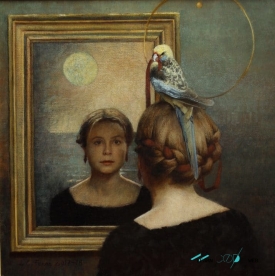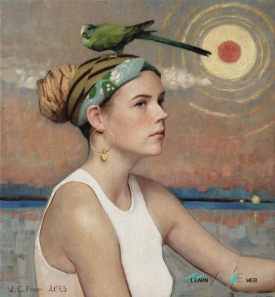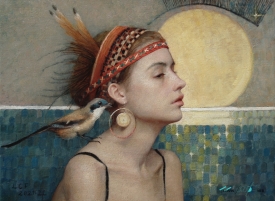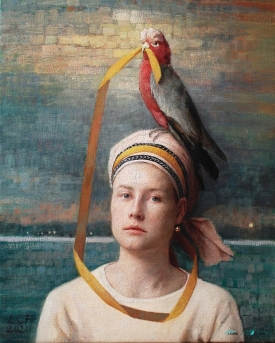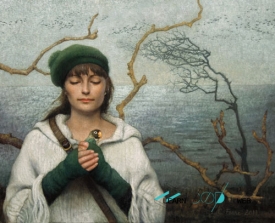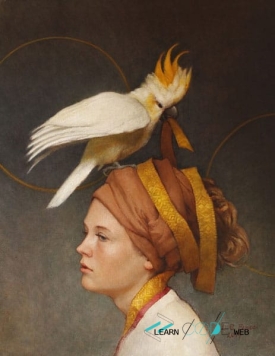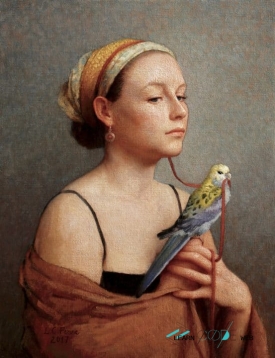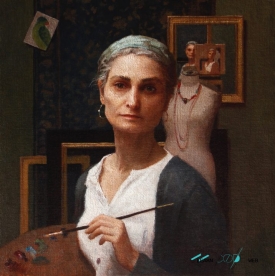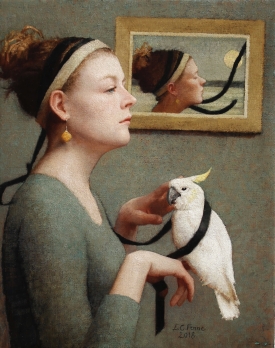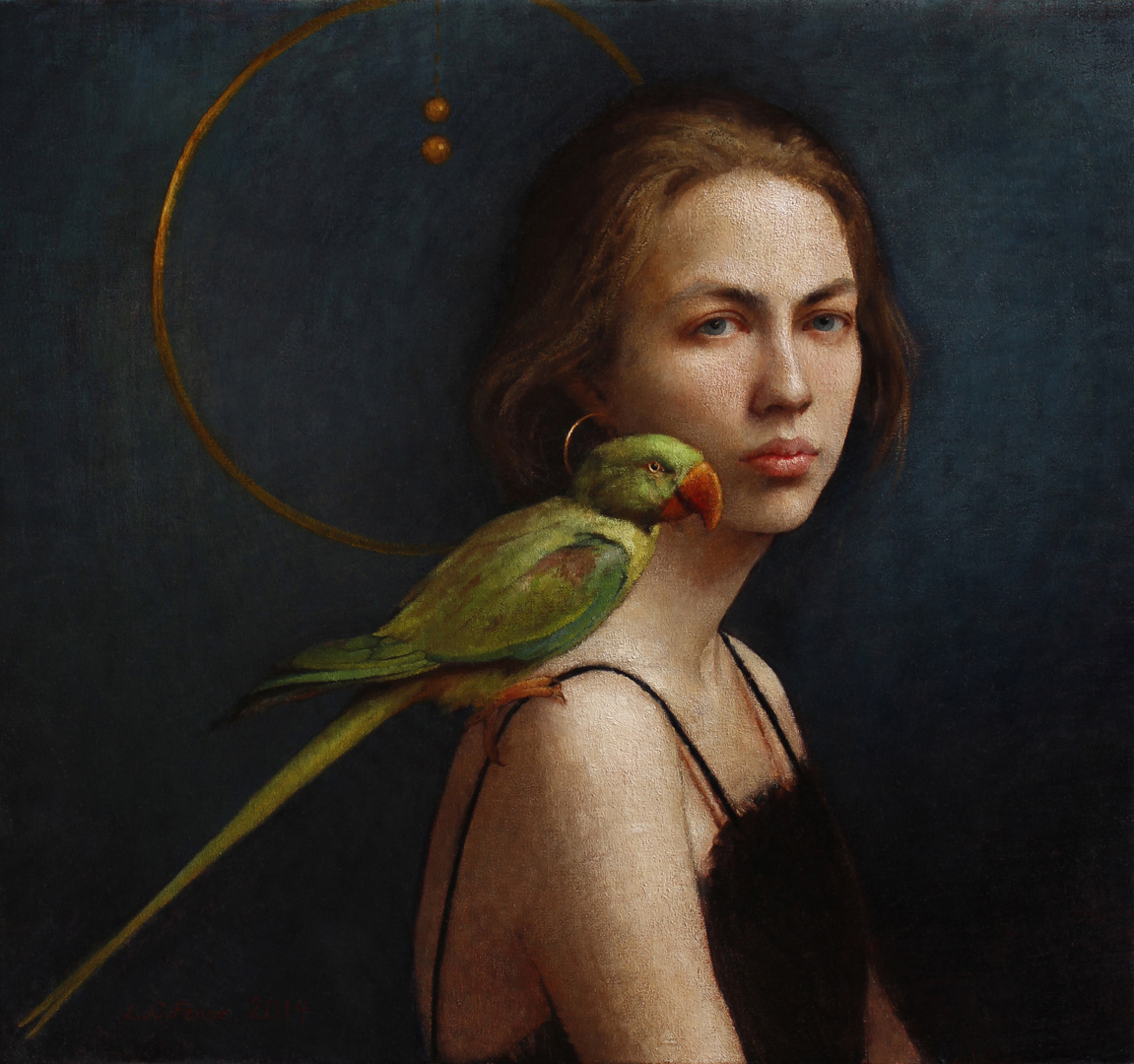
Louise Camille Fenne, born in 1972 in Copenhagen, Denmark, is a prominent artist who has masterfully combined traditional techniques with a contemporary approach in her works. With Danish and English roots, Fenne has built her education and artistic career across Denmark, England, France, and Italy, absorbing a rich cultural diversity that is reflected in every brushstroke.
Initially trained in Aix-en-Provence and at the Glyptotek in Copenhagen, Fenne decided to deepen her knowledge at the prestigious Florence Academy of Art in 1995, drawn by the rigorous study of traditional painting and drawing techniques. This academic foundation was enriched during her time in Amsterdam and later in Lucca, Italy, where she collaborated closely with the American painter Charles Weed. Together, they have shared a studio in Svendborg, Denmark, where they reside with their two children.
The art of Louise Camille Fenne is characterized by her ability to capture the essence of her subjects through portraits, still lifes, and interiors, employing a technique based on prolonged observation and the application of paint layers that aim to achieve visual harmony. The artist prefers to make visual statements rather than intellectual ones, allowing her works to speak for themselves with a life of their own that captures the viewer's attention.
During an academic year in Florence, Italy, Fenne reexamined Renaissance masterpieces, which reignited her desire to explore beyond strict realism, pushing her to innovate in her artistic expression. This period not only revitalized her art but also allowed her to integrate classical influences with her modern vision.
Fenne has participated in numerous exhibitions in both Europe and the United States, and her work is appreciated for its ability to merge classical learning with modern themes, specializing in human figures and nature, often highlighting women and birds in her compositions.
In her portraits of women, Louise Camille Fenne often focuses on the serenity and strength emanating from her subjects, representing them in moments of reflection or in everyday settings that highlight their individuality and character. Women in her works are often the center of the visual narrative, shown with a richness of detail that suggests a deeper narrative behind each image.
This approach is complemented by the choice of subjects and the way they are positioned within the composition, reflecting a deep respect and admiration for the female figure. Thus, Fenne not only highlights the physical beauty of her models but also celebrates their emotional and psychological complexity, offering a balanced and humanized view that is powerfully resonant.
Louise Camille Fenne continues to be a prominent figure in the world of contemporary figurative art, an artist who stands out for her commitment to tradition and her courageous exploration of new expressive possibilities in art. Her work is not only a testimony of technical skill but also a constant search for beauty and meaning in the everyday.
Initially trained in Aix-en-Provence and at the Glyptotek in Copenhagen, Fenne decided to deepen her knowledge at the prestigious Florence Academy of Art in 1995, drawn by the rigorous study of traditional painting and drawing techniques. This academic foundation was enriched during her time in Amsterdam and later in Lucca, Italy, where she collaborated closely with the American painter Charles Weed. Together, they have shared a studio in Svendborg, Denmark, where they reside with their two children.
The art of Louise Camille Fenne is characterized by her ability to capture the essence of her subjects through portraits, still lifes, and interiors, employing a technique based on prolonged observation and the application of paint layers that aim to achieve visual harmony. The artist prefers to make visual statements rather than intellectual ones, allowing her works to speak for themselves with a life of their own that captures the viewer's attention.
During an academic year in Florence, Italy, Fenne reexamined Renaissance masterpieces, which reignited her desire to explore beyond strict realism, pushing her to innovate in her artistic expression. This period not only revitalized her art but also allowed her to integrate classical influences with her modern vision.
Fenne has participated in numerous exhibitions in both Europe and the United States, and her work is appreciated for its ability to merge classical learning with modern themes, specializing in human figures and nature, often highlighting women and birds in her compositions.
The Woman in the Artist's Work
The work of Louise Camille Fenne offers an introspective and respectful look at the female figure, highlighting her dignity and the complexity of her emotions through her portraits and compositions. Fenne seems to capture not only the external appearance of her models but also their inner essence, which gives her paintings an emotional depth that transcends the canvas.In her portraits of women, Louise Camille Fenne often focuses on the serenity and strength emanating from her subjects, representing them in moments of reflection or in everyday settings that highlight their individuality and character. Women in her works are often the center of the visual narrative, shown with a richness of detail that suggests a deeper narrative behind each image.
This approach is complemented by the choice of subjects and the way they are positioned within the composition, reflecting a deep respect and admiration for the female figure. Thus, Fenne not only highlights the physical beauty of her models but also celebrates their emotional and psychological complexity, offering a balanced and humanized view that is powerfully resonant.
Louise Camille Fenne continues to be a prominent figure in the world of contemporary figurative art, an artist who stands out for her commitment to tradition and her courageous exploration of new expressive possibilities in art. Her work is not only a testimony of technical skill but also a constant search for beauty and meaning in the everyday.



